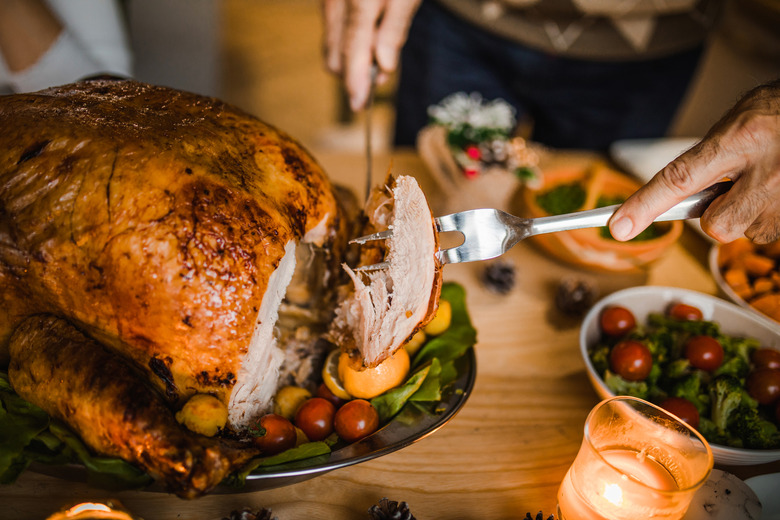Which Part Of The Turkey Is Healthier: White Meat Or Dark?
Whether it's packed into a hearty sandwich or served as the star of your holiday dinner, turkey is one of those foods you should never skimp on. Roasted, smoked or fried, the meat is the perfect protein for pairing with cheesy, hearty casseroles and impressive desserts.
How to Choose and Cook the Perfect Thanksgiving Turkey
Not only is turkey an iconic holiday centerpiece, but it's also rich in protein, vitamins and tryptophan. The important amino acid — tryptophan — helps to stimulate serotonin, which promotes a healthy amount of sleep and stabilizes your mood. Tryptophan is critical to both infants and adults.
And while all of the benefits of turkey sound great, you might be wondering: Is there a specific part of the turkey where you can get those nutrients? Should you choose white or dark meat when the turkey gets carved this year?
The answer isn't as black and white as you might think, according to Dana Harrison, a nutritionist who spoke to The Daily Meal in an email interview.
"Most people go for white meat because of its reputation of being a great source of lean protein," the nutritionist behind Eats 2 Know, LLC said. "Low in calories, low in fat."
However, the calorie differences in the two cuts of meat are pretty minimal. In fact, a 3.5-ounce serving of any part of the turkey falls within a range of about 160 to 190 calories if you eat it without the skin.
"Dark meat has almost the same amount of protein per ounce but has gotten a bad rap due to its fat content," she said. "It's time to debunk that."
What it really boils down to is which part of the turkey you like more and whether or not the meat's fat percentage is something you're tracking — even though there are several surprising reasons why adding more fat to your diet isn't a bad thing.
Although dark meat has about two times as much fat as white meat, those fats help you feel more satiated by your meal, and they have a number of health benefits. Dark meat is higher in certain nutrients, including iron, zinc, B vitamins and selenium.
Harrison suggests that you choose the option that you prefer taste-wise and recommends avoiding restrictive thoughts on food around the holidays.
"Instead of labeling foods as 'good' and 'bad' or having feelings of guilt and thinking, 'I shouldn't eat this,' focus on mindful eating," she said. "Be present when you're eating and listen to your hunger."
No matter which cut of turkey you choose to enjoy this year, the most important thing is making sure your holiday star is cooked right. Year after year, people make the same common turkey mistakes. Here's how to avoid them.
